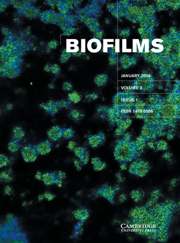Crossref Citations
This article has been cited by the following publications. This list is generated based on data provided by
Crossref.
Borriello, Giorgia
Richards, Lee
Ehrlich, Garth D.
and
Stewart, Philip S.
2006.
Arginine or Nitrate Enhances Antibiotic Susceptibility of
Pseudomonas aeruginosa
in Biofilms
.
Antimicrobial Agents and Chemotherapy,
Vol. 50,
Issue. 1,
p.
382.
Rabinovitch, Christine
and
Stewart, Philip S.
2006.
Removal and Inactivation of
Staphylococcus epidermidis
Biofilms by Electrolysis
.
Applied and Environmental Microbiology,
Vol. 72,
Issue. 9,
p.
6364.
Vishnivetskaya, Tatiana A.
Siletzky, Robin
Jefferies, Natalie
Tiedje, James M.
and
Kathariou, Sophia
2007.
Effect of low temperature and culture media on the growth and freeze-thawing tolerance of Exiguobacterium strains.
Cryobiology,
Vol. 54,
Issue. 2,
p.
234.
Bjergbaek, L.A.
Haagensen, J.A.J.
Molin, S.
and
Roslev, P.
2008.
Effect of oxygen limitation and starvation on the benzalkonium chloride susceptibility ofEscherichia coli.
Journal of Applied Microbiology,
Vol. 105,
Issue. 5,
p.
1310.
Kim, Jaeeun
Pitts, Betsey
Stewart, Philip S.
Camper, Anne
and
Yoon, Jeyong
2008.
Comparison of the Antimicrobial Effects of Chlorine, Silver Ion, and Tobramycin on Biofilm.
Antimicrobial Agents and Chemotherapy,
Vol. 52,
Issue. 4,
p.
1446.
Stewart, Philip S.
and
Franklin, Michael J.
2008.
Physiological heterogeneity in biofilms.
Nature Reviews Microbiology,
Vol. 6,
Issue. 3,
p.
199.
Goeres, Darla M
Hamilton, Martin A
Beck, Nicholas A
Buckingham-Meyer, Kelli
Hilyard, Jackie D
Loetterle, Linda R
Lorenz, Lindsey A
Walker, Diane K
and
Stewart, Philip S
2009.
A method for growing a biofilm under low shear at the air–liquid interface using the drip flow biofilm reactor.
Nature Protocols,
Vol. 4,
Issue. 5,
p.
783.
Cotter, J.J.
O’Gara, J.P.
Stewart, P.S.
Pitts, B.
and
Casey, E.
2010.
Characterization of a modified rotating disk reactor for the cultivation of Staphylococcus epidermidis biofilm.
Journal of Applied Microbiology,
Vol. 109,
Issue. 6,
p.
2105.
Zuroff, Trevor R
Bernstein, Hans
Lloyd-Randolfi, Jenna
Jimenez-Taracido, Lourdes
Stewart, Philip S
and
Carlson, Ross P
2010.
Robustness analysis of culturing perturbations on Escherichia coli colony biofilm beta-lactam and aminoglycoside antibiotic tolerance.
BMC Microbiology,
Vol. 10,
Issue. 1,
Franks, Ashley E
Nevin, Kelly P
Glaven, Richard H
and
Lovley, Derek R
2010.
Microtoming coupled to microarray analysis to evaluate the spatial metabolic status of Geobacter sulfurreducens biofilms.
The ISME Journal,
Vol. 4,
Issue. 4,
p.
509.
Daddi Oubekka, S.
Briandet, R.
Fontaine-Aupart, M.-P.
and
Steenkeste, K.
2012.
Correlative Time-Resolved Fluorescence Microscopy To Assess Antibiotic Diffusion-Reaction in Biofilms.
Antimicrobial Agents and Chemotherapy,
Vol. 56,
Issue. 6,
p.
3349.
Stewart, Philip S.
Ghannoum, Mahmoud
Parsek, Matthew
Whiteley, Marvin
and
Mukherjee, Pranab
2015.
Antimicrobial Tolerance in Biofilms.
Microbiology Spectrum,
Vol. 3,
Issue. 3,
Stewart, Philip S.
2015.
Microbial Biofilms.
p.
269.
Hall, Clayton W.
and
Mah, Thien-Fah
2017.
Molecular mechanisms of biofilm-based antibiotic resistance and tolerance in pathogenic bacteria.
FEMS Microbiology Reviews,
Vol. 41,
Issue. 3,
p.
276.
Bahamondez-Canas, Tania F.
Heersema, Lara A.
and
Smyth, Hugh D. C.
2019.
Current Status of In Vitro Models and Assays for Susceptibility Testing for Wound Biofilm Infections.
Biomedicines,
Vol. 7,
Issue. 2,
p.
34.
Alfei, Silvana
and
Schito, Anna Maria
2020.
From Nanobiotechnology, Positively Charged Biomimetic Dendrimers as Novel Antibacterial Agents: A Review.
Nanomaterials,
Vol. 10,
Issue. 10,
p.
2022.
Dincer, Sadık
Masume Uslu, Fatima
and
Delik, Anil
2020.
Bacterial Biofilms.
Lahiri, Dibyajit
Nag, Moupriya
Banerjee, Ritwik
Mukherjee, Dipro
Garai, Sayantani
Sarkar, Tanmay
Dey, Ankita
Sheikh, Hassan I.
Pathak, Sushil Kumar
Edinur, Hisham Atan
Pati, Siddhartha
and
Ray, Rina Rani
2021.
Amylases: Biofilm Inducer or Biofilm Inhibitor?.
Frontiers in Cellular and Infection Microbiology,
Vol. 11,
Issue. ,
Lahiri, Dibyajit
Nag, Moupriya
Ghosh, Anushka
Das, Deboleena
Dey, Ankita
Mukherjee, Dipro
Garai, Sayantani
and
Ray, Rina Rani
2021.
Biofilm-Mediated Diseases: Causes and Controls.
p.
183.
Stewart, Philip S.
Williamson, Kerry S.
Boegli, Laura
Hamerly, Timothy
White, Ben
Scott, Liam
Hu, Xiao
Mumey, Brendan M.
Franklin, Michael J.
Bothner, Brian
Vital-Lopez, Francisco G.
Wallqvist, Anders
and
James, Garth A.
2022.
Search for a Shared Genetic or Biochemical Basis for Biofilm Tolerance to Antibiotics across Bacterial Species.
Antimicrobial Agents and Chemotherapy,
Vol. 66,
Issue. 4,




